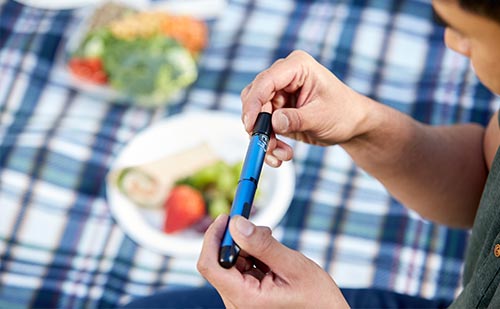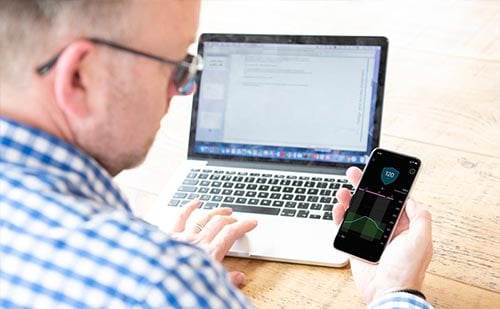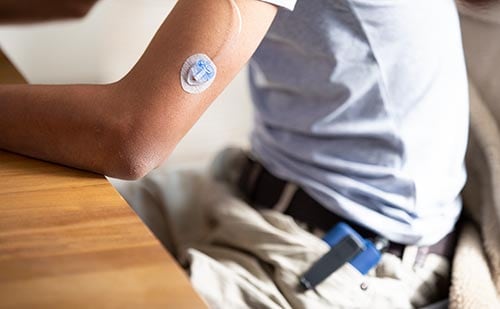Caring for our planet is the right thing to do
Across the healthcare industry, we recognize that there is a lot of work to do to decrease impact to the environment. We are striving to play our part, guided by environmental, social, and governance (ESG) priorities.

How Medtronic is making an impact
We’ve incorporated more eco-friendly standards into some of our latest products.
How Medtronic will make an impact in the future
We’re striving toward critical milestones across Medtronic, one step at a time.
How you can make an impact
We know that every action we take will impact the future of our communities. Here’s how you can play a part.
Proper waste disposal and recycling can be one of the biggest ways to make an impact. But when you look through your cabinet filled with diabetes supplies, it may be hard to figure out what can be recycled or disposed of as medical waste.
Diabetes supplies
If there’s a recycling symbol on a product package, you should be able to recycle it. Here are general guidelines for recyclable Medtronic materials in the United States, but please check for guidance in your local area (since this could vary.)
You can recycle:
- User guides and other printed materials made from paper
- Product packaging, including the outer plastic carton for infusion sets and reservoirs
- Product boxes, including InPen™ smart pen containers and cardboard insulin pump boxes
- Product shipping boxes made from cardboard
Although it would be nice to be able to give away unexpired and unused supplies, remember that a valid prescription is required to use these products. Some charitable organizations can help navigate the donation process, one of which is the Royal Diabetes Medical Equipment, Inc. You can also discuss donations with your doctor’s office or pharmacy.
Needles
Needles should be disposed of in a sharps container (or alternate that can’t be easily punctured). This includes products with combined serters that include the needle, such as MiniMed™ Mio™ Advance infusion set.
Diabetes devices
Unfortunately, many components of Medtronic devices are considered “mixed waste” or “electronic waste” and can’t be recycled. This could range from an out-of-warranty continuous glucose monitor (CGM) transmitter to an InPen™ smart insulin pen. As a rule of thumb, these should be placed in an electronic waste bin.
If you’re interested in donating an insulin pump that you’re not using anymore, you need to provide a letter of donation to the person receiving the donation. Your pump will be replaced by a recertified pump (with a 2-year warranty) for them, and they will be charged $495. To learn more, call 1-800-646-4633, option 5 (Monday-Friday 8am - 6pm Central Time).
Please keep in mind that you cannot donate a CGM transmitter. If you receive a new transmitter, dispose of your old transmitter at a local certified battery recycling center.
Thank you for playing your part to help the planet. We are in this together.
^ vs the 3-days infusion set MiniMed™ Quick-set™
^^ Fusselman H, Chattaraj S, Fienup M, Rooney O. The Extended Wear Infusion Set - A Design for Plastic Waste Reduction. Virtual Diabetes Technology Meeting. 2020. Poster FUSS2015D.
* Compared to FY20
** Compared to a FY21 baseline
+ Targeting high-volume products in various Medtronic operating units (not just Medtronic Diabetes), compared to a FY21 baseline
Important Safety Information: MiniMed™ 770G System With SmartGuard™ Technology
The MiniMed™ 770G system is intended for continuous delivery of basal insulin (at user selectable rates) and administration of insulin boluses (in user selectable amounts) for the management of type 1 diabetes mellitus in persons two years of age and older requiring insulin as well as for the continuous monitoring and trending of glucose levels in the fluid under the skin. The MiniMed™ 770G System includes SmartGuard™ technology, which can be programmed to automatically adjust delivery of basal insulin based on continuous glucose monitoring (CGM) sensor glucose values (SG) and can suspend delivery of insulin when the SG value falls below or is predicted to fall below predefined threshold values.
The Medtronic MiniMed™ 770G System consists of the following devices: MiniMed™ 770G Insulin Pump, the Guardian™ Link (3) Transmitter, the Guardian™ Sensor (3), one-press serter, the Accu-Chek® Guide Link blood glucose meter, and the AccuChek®Guide Test Strips. The system requires a prescription.
The Guardian™ Sensor (3) has not been evaluated and is not intended to be used directly for making therapy adjustments, but rather to provide an indication of when a fingerstick may be required. All therapy adjustments should be based on measurements obtained using a blood glucose meter and not on values provided by the Guardian™ Sensor (3).
All therapy adjustments should be based on measurements obtained using the Accu-Chek® Guide Link blood glucose meter and not on values provided by the Guardian™ Sensor (3). Always check the pump display to ensure the glucose result shown agrees with the glucose results shown on the Accu-Chek® Guide Link blood glucose meter. Do not calibrate your CGM device or calculate a bolus using a blood glucose meter result taken from an alternative site. It is not recommended to calibrate your CGM device when sensor or blood glucose values are changing rapidly, e.g., following a meal or physical exercise.
WARNING: Do not use the SmartGuard™ Auto Mode for people who require less than 8 units or more than 250 units of total daily insulin per day. A total daily dose of at least 8 units, but no more than 250 units, is required to operate in SmartGuard™ Auto Mode.
WARNING: Do not use the MiniMed™ 770G system until appropriate training has been received from a healthcare professional. Training is essential to ensure the safe use of the MiniMed™ 770G system.
Pump therapy is not recommended for people whose vision or hearing does not allow recognition of pump signals and alarms. Pump therapy is not recommended for people who are unwilling or unable to maintain contact with their healthcare professional. The safety of the MiniMed™ 770G system has not been studied in pregnant women. For complete details of the system, including product and important safety information such as indications, contraindications, warnings and precautions associated with system and its components, please consult https://www.medtronicdiabetes.com/important-safetyinformation#minimed-770g and the appropriate user guide at https://www.medtronicdiabetes.com/download-library
Software Upgrade Terms and Conditions
Software upgrade process is subject to change and may result in healthcare provider office visit and may result in out-of-pockets expenses such as co-pay, depending on insurance coverage.
MiniMed™ pumps and software have certain labeling restrictions that may exclude certain populations, including age and type of diabetes. We recommend you consult your healthcare provider regarding your eligibility to receive the software upgrade based on the labeling of the upgrade, which may differ from the labeling of the MiniMed™ 770G pump.
This program applies to the insulin pump software only. Continuous Glucose Monitor products and consumables are not included in this offer.
A valid prescription will be required for this software upgrade. All participants should consult their healthcare provider for all therapy related decisions.
Warranty dates do not reset. The replacement warranty date of an insulin pump upgraded with the software will remain the same as the replacement warranty date of the initial pump purchased.
Insurance coverage and plan design varies and may impact the ability to upgrade. Coverage is contingent upon your health insurance medical policy guidelines. Restrictions and medical necessity requirements may apply.
Important Safety Information: InPen™ smart reusable pen
The InPen™ is a reusable insulin pen for people living with diabetes. It can be used to deliver insulin, help calculate insulin doses, and estimate carbohydrates for meals. Those under the age of 7 should only use the device with an adult’s supervision. A healthcare provider must prescribe InPen, provide dosage settings, and discuss all potential benefits and risks. Using the device with incorrect therapy settings may lead to severe highs and lows. The InPen™ should not be used by those unable to test blood glucose levels or the visually impaired. For additional product and important safety information, click here.
Important Safety Information: Infusion sets
Infusion sets are indicated for the subcutaneous infusion of insulin from an infusion pump. Infusion sets are indicated for subcutaneous use only and not for intravenous (IV) infusion or the infusion of blood or blood products. Inaccurate medication delivery, infection and/or site irritation may result from improper insertion and maintenance of the infusion site. Before insertion, clean the insertion site with isopropyl alcohol. Remove the needle guard before inserting the infusion set. If using this infusion set for the first time, do the first set-up in the presence of your healthcare professional. Do not leave air in the infusion set. Prime completely. Check frequently to make sure the soft cannula remains firmly in place as you may not feel pain if it pulls out. The soft cannula must always be completely inserted to receive the full amount of medication. If the infusion site becomes inflamed, replace the set, and use a new site until the first site has healed. Replace the infusion set if the tape becomes loose, or if the soft cannula becomes fully or partially dislodged from the skin. Product use duration varies from 48-72 hours for most infusion set types—and up to 168 hours for the Extended Wear Infusion Set. Please consult the applicable user guide for full details.
Medtronic Diabetes insulin infusion pumps, continuous glucose monitoring systems and associated components are limited to sale by or on the order of a physician and should only be used under the direction of a healthcare professional familiar with the risks associated with the use of these systems. Many also have indications for use that may not be appropriate for a given age group, or condition type, such as pregnancy. For more information on our products, their specific indications, and associated risks, please consult http://www.medtronicdiabetes.com/support/download-library/user-guides and important safety information.








